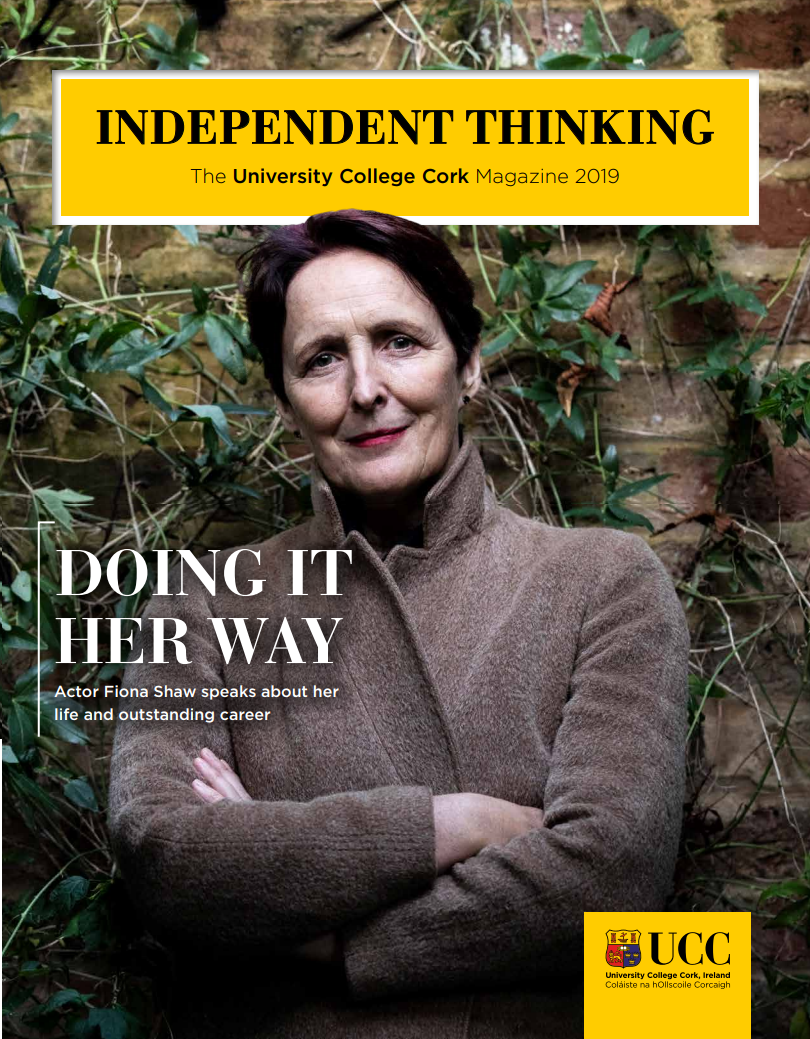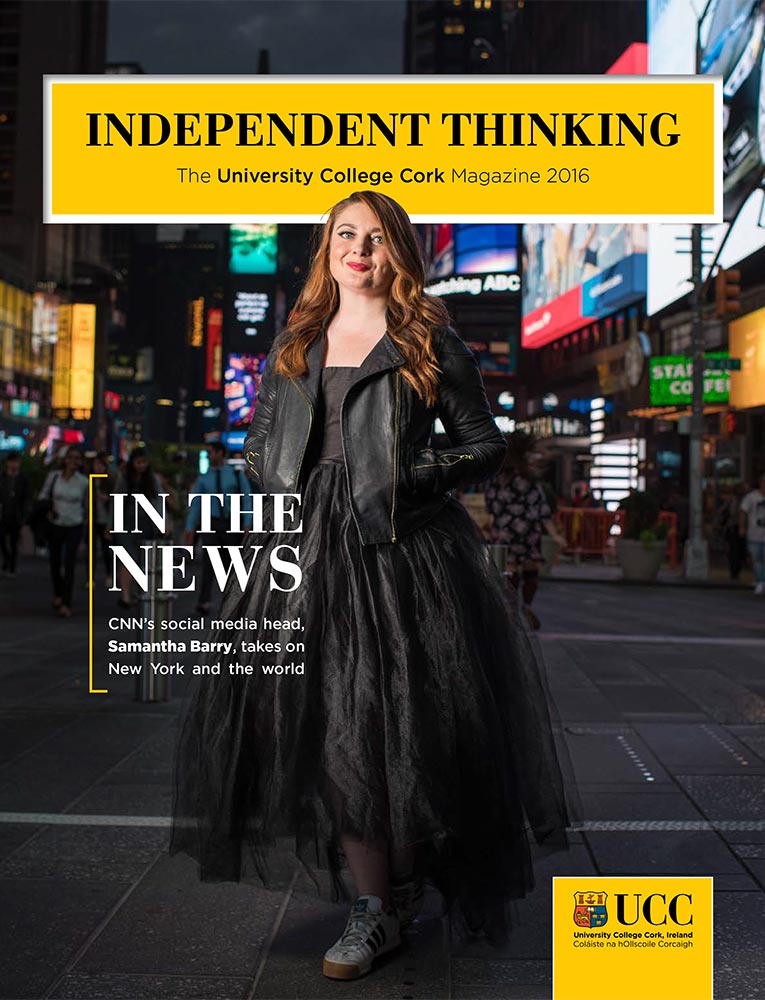'Good people who do good things'
Alicia O’Sullivan, Quercus Active Citizenship Scholar* and founder of Safety Over Stigma, and Professor Louise Crowley, Director of the Bystander Intervention Programme, talk activism and combating gender-based violence with Alana Daly Mulligan.
Content warning: This piece refers to issues relating to sexual harassment, image-based sexual abuse and gender-based violence. Reader discretion is advised.
.png)
It’s a dull Thursday evening on UCC’s main campus but sitting inside the Bystander Intervention Offices in South Lodge wouldn’t give that impression. The walls are splattered with artwork and yellow signs, there are smatterings of tote bags and bright fuchsia hoodies adorning the backs of chairs. The activities of UCC’s Bystander Week 2022 are everywhere to be seen.
Professor Louise Crowley, Director of the Bystander Intervention Programme – the university’s response to sexual harassment and violence on campus and in the wider community – has just finished a Zoom call to a collective of secondary school principals from around the country, looking to introduce the Bystander training to their schools in the hope of developing an earlier response to sexual harassment and violence prevention. Alicia O’Sullivan comes in the door, up to her eyes coordinating UCC’s first Students’ Union-led Green Week on campus. Glum weather aside, it’s been a busy week. How we got to this point with these two leaders in one room is a far more interesting, difficult yet inspiring story.
Alicia made her way into activism through the environmentalism movement. “I was really interested in social justice … I wanted to study law since I was twelve,” she explains, citing her involvement in organisations like Comhairle na nÓg and YMCA as fundamental in helping her make that natural shift towards becoming an international spokesperson for climate justice. But Alicia says that founding the Safety Over Stigma campaign was the consequence of a mix of unfortunate circumstances.
In April 2021, Alicia was the victim of cybercrime when her identity was stolen and used to create a fake explicit Instagram account. Alicia’s report to authorities initially fell on deaf ears, with a lack of empathy for her situation; and thus, using her platform, she started a conversation around the issue of image-based sexual abuse, IBSA.
.png)
“I remember the day distinctly, when I saw your tweet,” says Louise to Alicia, of that week. A few phone calls later and the two connected, with Louise encouraging Alicia to go to the gardaí a second time.
“Alicia raising the issue [of IBSA] as it played out for her really captured not only her generation’s attention, but their own lived experiences,” says Louise. “I think too often with gender-based violence, it’s not that the survivor gets lost, but that we don’t hear their voice loud enough. It is vital that anything we develop – whether it’s training, the criminal justice system, or support services – is informed by the experience of people who have survived gender-based violence or whatever form of abuse is at issue. So, Alicia, being a voice for people her age and people who have that experience, is so crucial because until we speak up about these experiences, they remain hidden.”
Alicia’s experience also led to the creation of Safety Over Stigma. “I suppose at the beginning, we didn’t really know what it was going to be, we just knew that people were listening, and we had an opportunity to say something. It was very grassroots,” explains the second-year law student, who recounts how initial support from Professor Crowley and Dr Emer Clifford in UCC developed into endorsements by Ivana Bacik TD, bringing forward the debate around sensitivity training for An Garda Síochána to the Dáil, followed by Senator Malcolm Byrne who helped mobilise the conversation to the Oireachtas.
For Louise, to be able to support Alicia as a member of the Quercus Active Citizenship team, as well as being an expert in the area, was important. The partnership fostered a relationship that allowed these two activists to go on to speak before the joint Oireachtas Committee on the Online Safety and Media Regulation Bill in July 2021, where Alicia’s testimony played a central role in the discussions that would follow. Both Alicia and Louise emphasise how important the experience was in highlighting how regulating the digital space isn’t just abstract law – that it impacts people’s lives and creates infrastructures of support. “It was a really successful marrying of both our experiences and our shared vision for change,” Louise says.
“It might be a weird thing to say, not that I’m glad it happened at all, but in a way maybe I am glad that it was me and not someone else” - Alicia O'Sullivan
Safety Over Stigma has since partnered with the Department of Justice on campaigns around IBSA, and Alicia has also visited schools, using her own experience as a tool for teaching around the issue. Recently, she returned to her secondary school in Skibbereen to pilot presentations for teenagers around IBSA. “I think if young people haven’t heard about [IBSA], they should be educated about it; and, I think, if they do know about it, it could be too late,” says the Quercus scholar.
But this is only the beginning of the initiative, Alicia explains: “[Safety Over Stigma] all happened so quickly that I think now we’re reflecting on how we can go forward. There were an awful lot of intense things happening, that we're now trying to get back to the root of what we were trying to do which is to inform, educate and empower people. I think the school presentations are a way to do that, because what we noticed is having two young people talk about these issues to young people was probably the most impactful part of the whole thing.”
For the young activist, the last 12 months have brought their challenges, and how we got to this room to have this conversation about the change both Alicia and Louise have enacted is nothing short of extraordinary. While it was a situation some might never recover from, Alicia in her strength focuses her sights on the positives: “It might be a weird thing to say, not that I’m glad it happened at all, but in a way maybe I am glad that it was me and not someone else.”
Recalling how, on the day, she was “the most visibly upset” she had ever been, Alicia credits the intimate nature of being from a rural community in West Cork as what ultimately prompted her to act: “When I got home, I just thought to myself, ‘it’s not actually about me’. I thought about my neighbour’s little kids, four girls, and I knew I didn’t want what happened to me to happen to them when they grow up.”
By now, all three of us are tearing up. “We should’ve done the photos first!” jokes Alicia. Louise and I concur, while wiping our eyes, before Alicia continues, “After seeing how many people have been affected not just by image-based sexual abuse but also by sexual crimes and how they’ve been treated, I just saw speaking up about it as something that I could do in my position to help.”
“We want good people who do good things in this university,” Louise adds, explaining that Alicia’s response to the traumatic event, through using her skills and experience as an activist, is one of the reasons why the issue of IBSA is a national conversation now. “I think [Alicia’s activism is] a real reflection of all that is powerful about the Quercus Active Citizenship stream. It is just a testament to this university, that it recognises the value of doing the right thing by society, seeing beyond yourself and wanting to make a change.”
*The Quercus Talented Students’ Programme is supported by Ford.
Visit the Bystander Intervention Programme website for more information.
Photography: Alana Daly Mulligan



